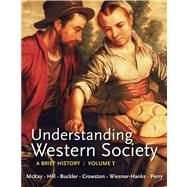Based on the highly successful A History of Western Society, Understanding Western Society: A Brief History captures students’ interest in the everyday life of the past and ties social history to the broad sweep of politics and culture. Abridged by 30%, the narrative is paired with innovative pedagogy, designed to help students focus on significant developments as they read and review. An innovative, three-step end-of-Chapter study guide helps students master key facts and move toward synthesis.








